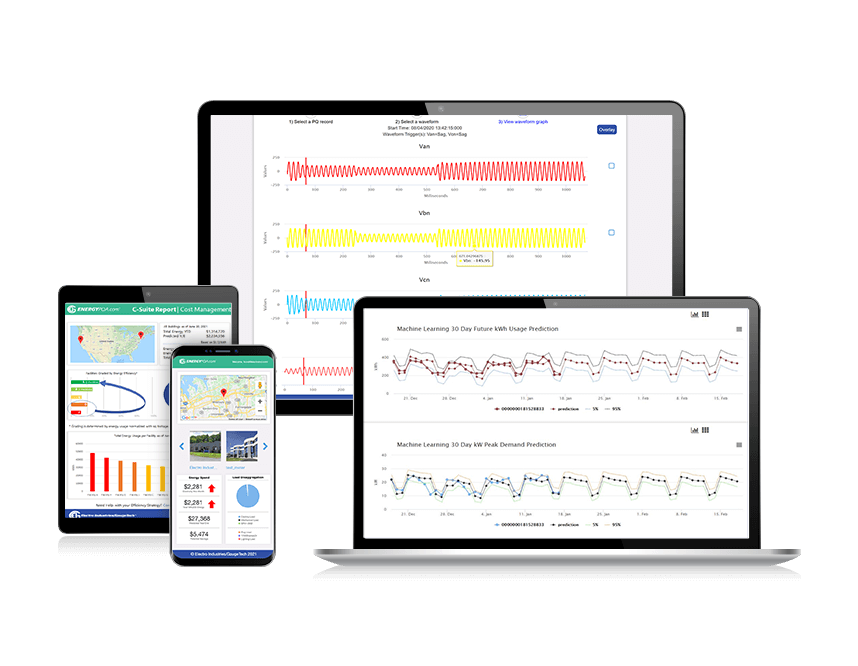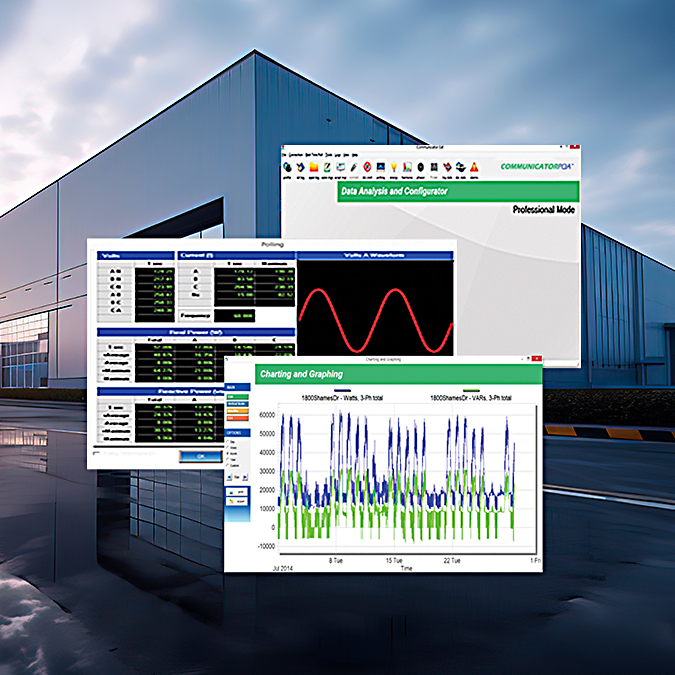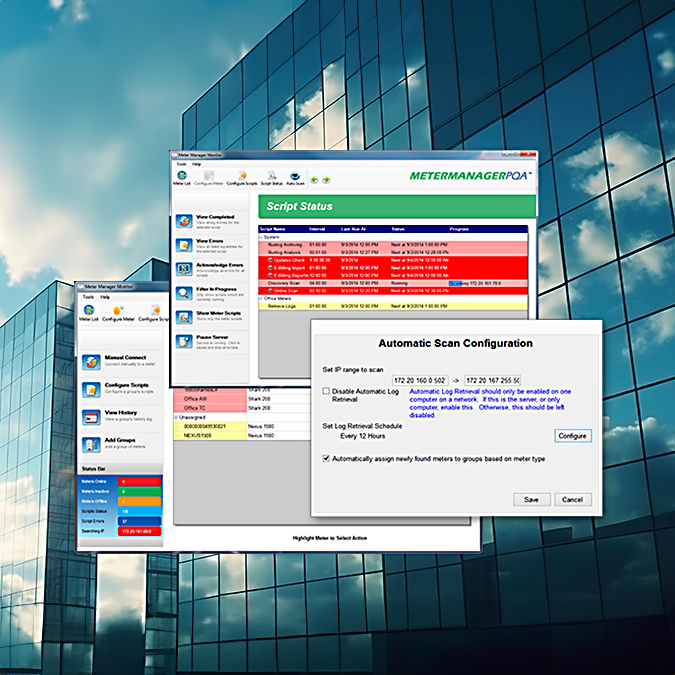Energy Management
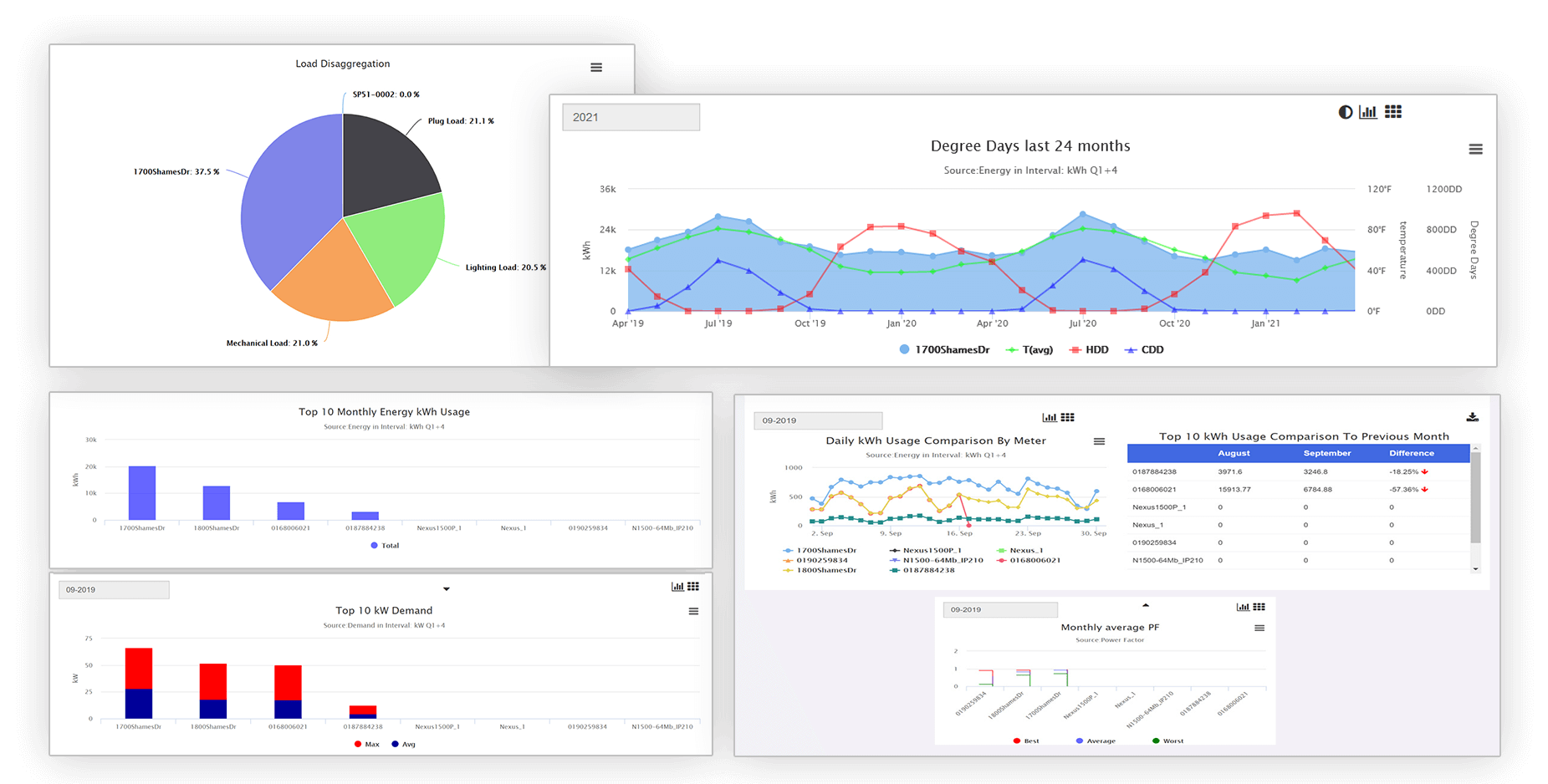
Enterprise Energy Management
Identify Poorly Performing Buildings – an Energy Efficient Building Can Consume up to 85% Less Power
- Compare energy usage across facilities.
- View energy dashboards with predictive intelligence.
- Report on highest demand contributors.
- Report on highest energy usage.
- Monitor carbon footprint to determine impact on the environment.
- Chart degree days.
- Perform load disaggregation.
- View system status screens for all enterprise facilities.
AI Predictive Analytics
Immediate and Significant Cost Savings by Implementing Even Modest Demand Reduction
- Take action on peak demand predictions in advance of penalty.
- Use the energy management system’s advanced AI and machine learning to accurately predict demand and energy usage into the future.
- Obtain highly accurate predictions based on historical weightings and future weather forecasts.
- Provides day and specific hour of predicted peak demand.
- Reduce peak demand costs significantly.
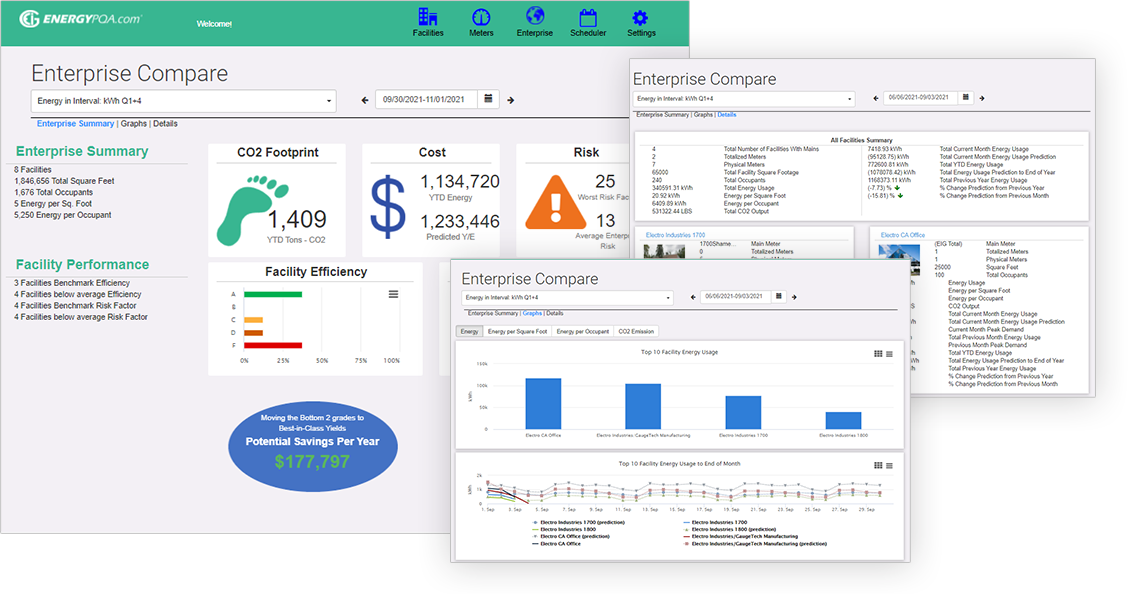
Enterprise Level Reporting
Provides Analysis for Your Complete Business
- Grade facilities and identify potential savings.
- View energy analytics for facility comparisons, including: energy usage, energy used per square foot, energy used per occupant.
- Easily view enterprise summary within the energy management system.
- Determine impact on the environment and assess the success of sustainability initiatives by monitoring total and per location carbon footprint.
- View predicted energy usage for each facility through end of the year and identify change from the prior month and year.
- View total energy usage for last five years.
- View top ten facilities for usage and predicted usage through end of the month.
- Totalize meters for accurate depiction of full facility load.
W.A.G.E.S.
New! Manage All Facility Commodity Usage
- Eliminate discrete systems for facility commodities’ usage.
- Analyze water, air flow, gas, electric, and steam (W.A.G.E.S.) usage from pulse or analog inputs of EIG meters.
- Predict commodity usage and costs through the end of the month.
- Disaggregate total commodity costs.
- Leak Detective™ discovers facility leaks to identify commodity waste and areas in need of repair.
- For water, higher than expected flow rate.
- For air, lower than usual air flow (for analog inputs only).
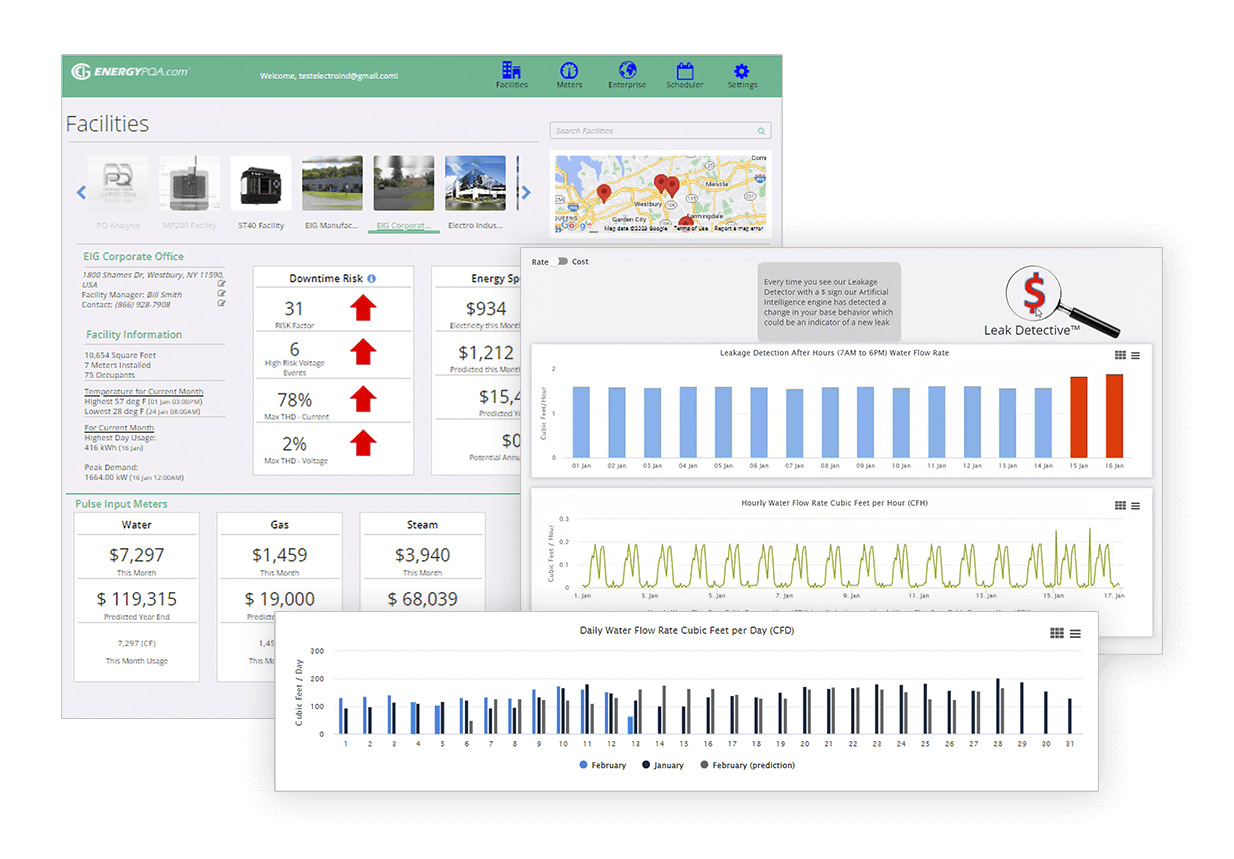
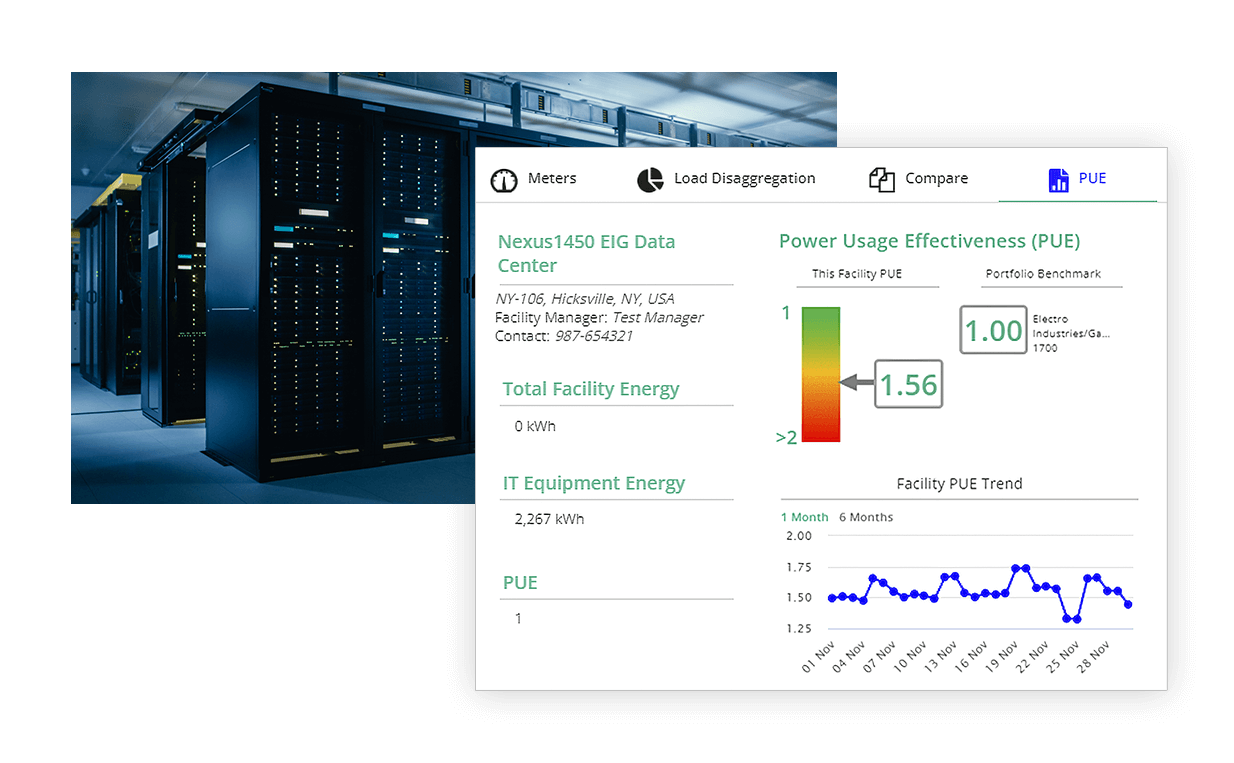
PUE
New! Power Usage Effectiveness for Data Centers
- Data centers measure their power usage effectiveness (PUE) by dividing the overall power usage for the data center by the amount of power used to run IT equipment.
- The PUE number helps data centers determine whether they are using energy efficiently, i.e., spending more of their energy budget on energy used to generate income (computing equipment) rather than energy used for loads that don’t generate income (i.e., cooling systems).
Power Quality
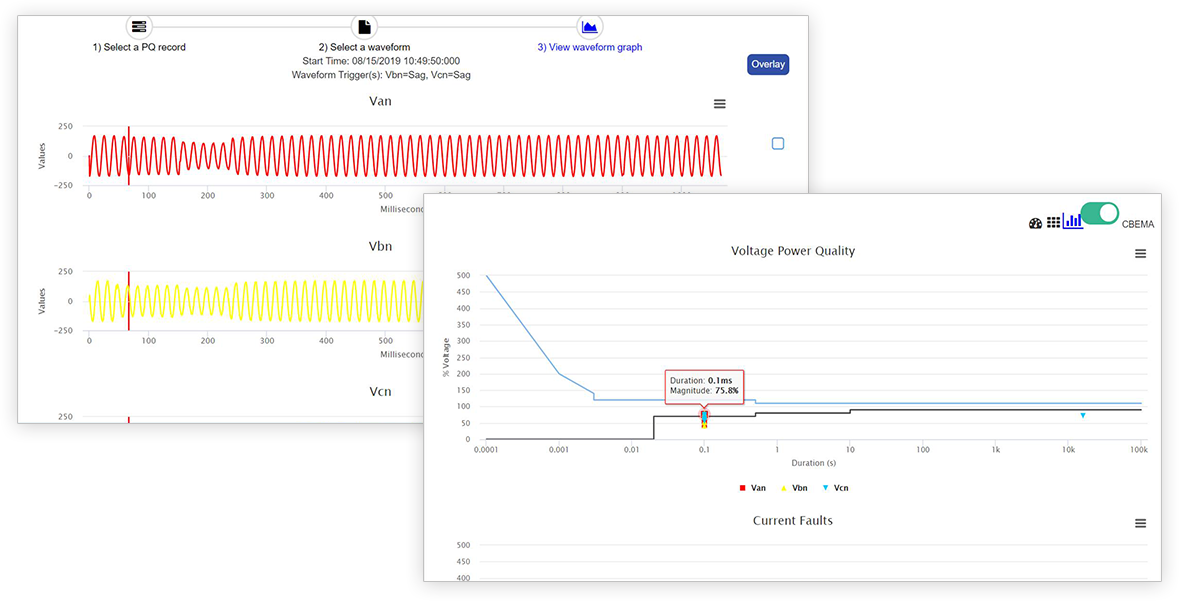
Power Quality Insights
Reduce Risk and Improve Uptime Using Power Quality Analysis
- Facility and circuit level power quality risk grading.
- Transient analysis with CBEMA and SEMI F47.
- Phase imbalance analysis.
- Graphical waveform records of voltage surges, sags, and other fault events.
- Alarming on all power quality events.
- Compliance to EN 50610 and IEEE 519.
Harmonic and Power Factor Analysis
Reduce Costs by Mitigating Harmonics and Reducing Power Factor Surcharges
- Monitor harmonic magnitudes and THD.
- Assess the impact of harmonics on equipment.
- Determine poor power factor, which causes power system inefficiency.
- Collect historical power factor per circuit to determine and correct worst scenarios.
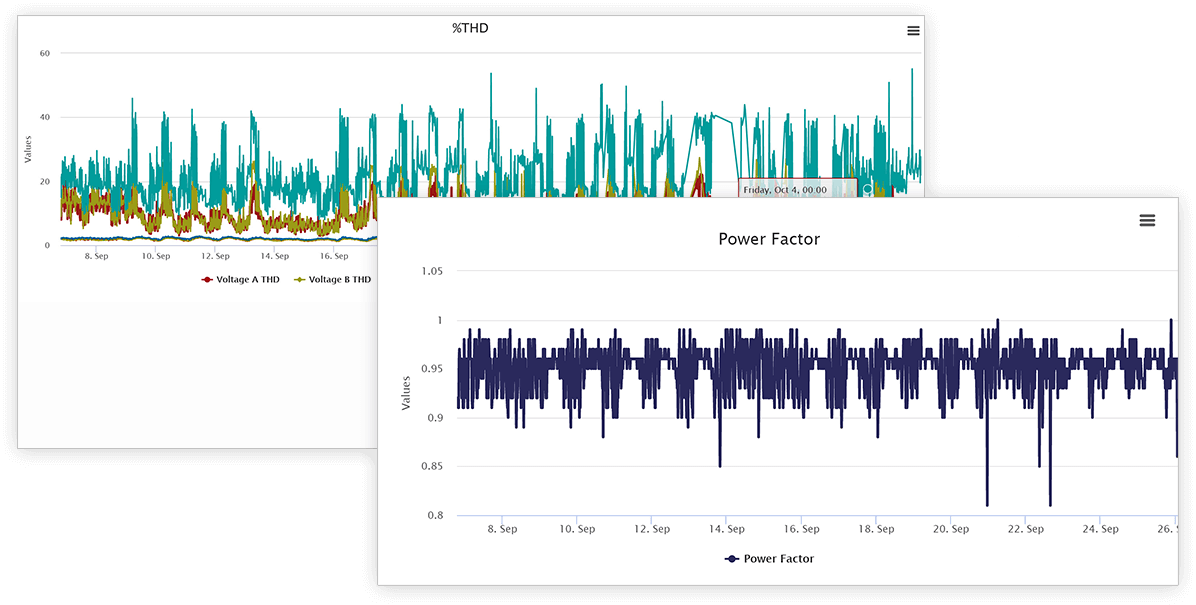
Single Cycle Waveform with RMS Data, Range Marker, and Annotation
Advanced Waveform Analysis
Record and Share Waveform Insights
- Annotate events with comments and timing that will be saved in the database for sharing with others and to keep a historical perspective.
- View single cycle waveform analysis with RMS data.
Power Quality Direction
Pinpoint Location of Faults for Fast Recovery
- When an event occurs, being able to pinpoint the exact location of the fault ensures speedy recovery and timely mitigation of losses.
- Using its PQ Direction algorithms, EnergyPQA.com® will identify the location of the fault, either upstream or downstream from the device.
- With this information, your team can take immediate action.
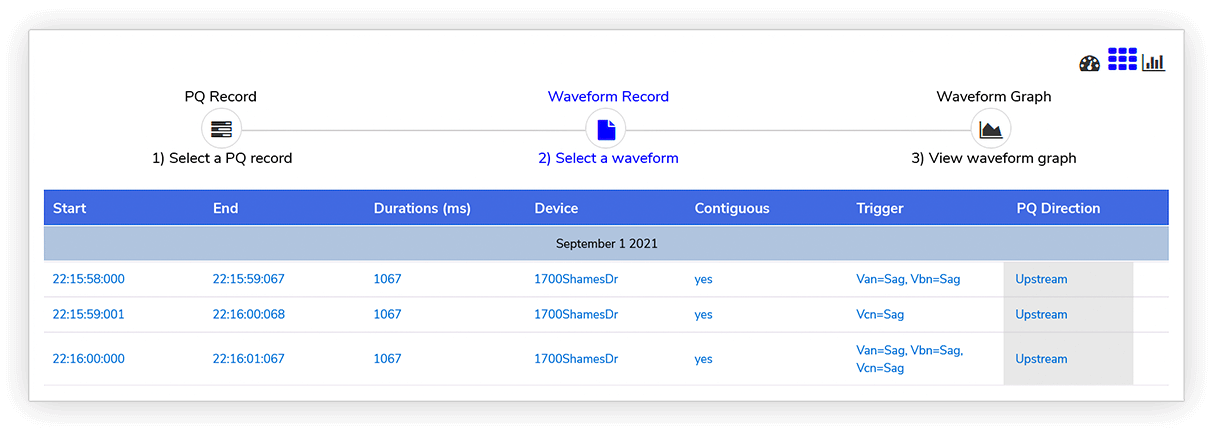
Determine whether the fault is upstream or downstream from the meter to take corrective action.
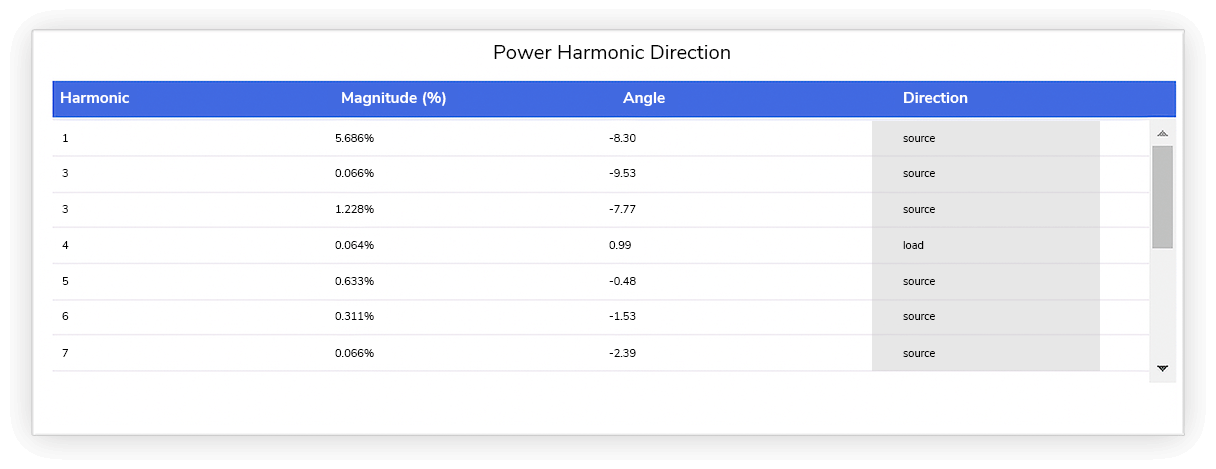
EnergyPQA.com® determines the power harmonic direction so that you can take corrective action.
Power Harmonic Direction
Facilitates PQ Event Response
- View the magnitude and angle of the waveform harmonics of a PQ event.
- Easily see if the harmonics are due to load or source – either internal or external to your electrical system.
- Determine corrective action based on this information.
Reports
C-Suite Reporting Reduces Engineering Analysis Time by up to 98%!
C-Suite Reporting
Reduce Costs and Mitigate Risk with C-Suite Reporting
- Identify corrective action to increase energy efficiency and reduce power quality risk in the worst enterprise circuits.
- Two C-Suite Report types:
- Cost Management that analyzes energy efficiency enterprise wide.
- Risk Mitigation that analyzes energy reliability enterprise wide.
- Three reports for each type:
- Summary for the enterprise facilities – available in thirty seconds.
- Enterprise Benchmark to compare facilities and uncover hidden issues.
- Single facility reports to determine the specific circuits most in need of improvement.
Cost Management C-Suite Reports
- Automatically grade facilities for energy efficiency using smart analytics.
- Identify least efficient buildings and potential savings from improving them.
- Obtain detailed enterprise level energy optimization reports.
- Single facility reports determine specific circuits most in need of improvement.
- Provides simple meaningful actions to allow users to focus on specific energy savings outcomes.
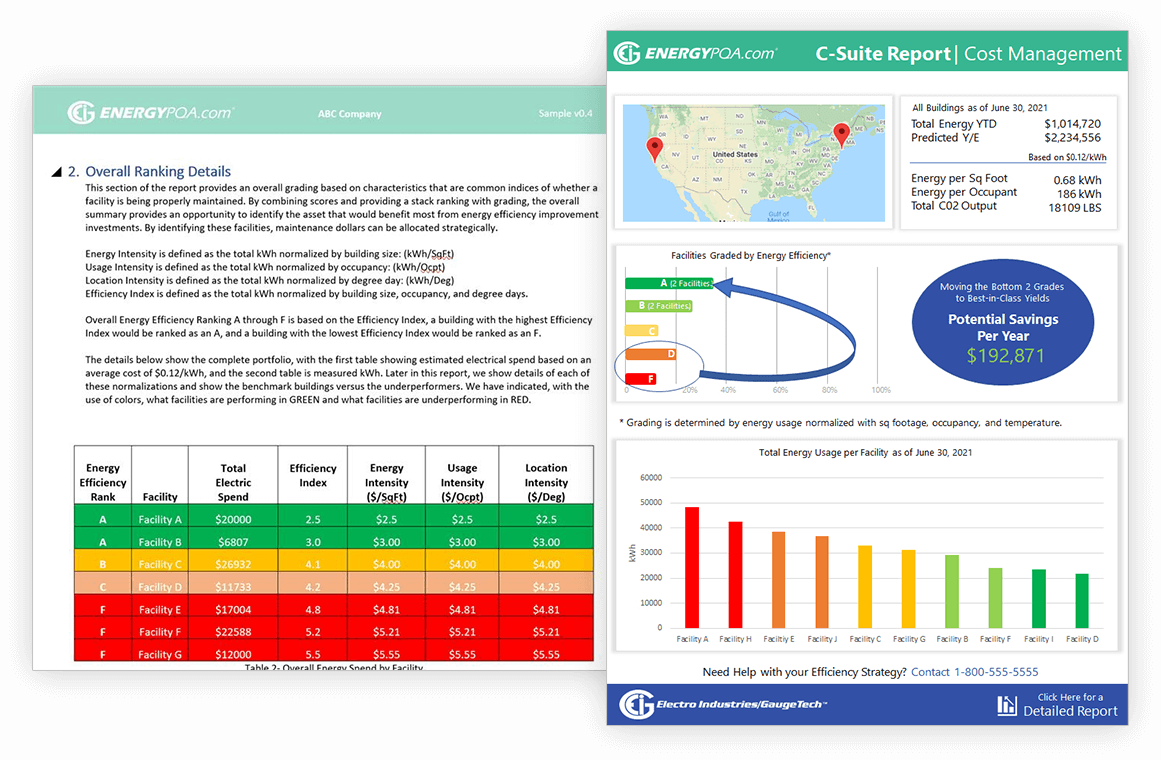
Cost Management C-Suite Reports Identify Energy Inefficiency
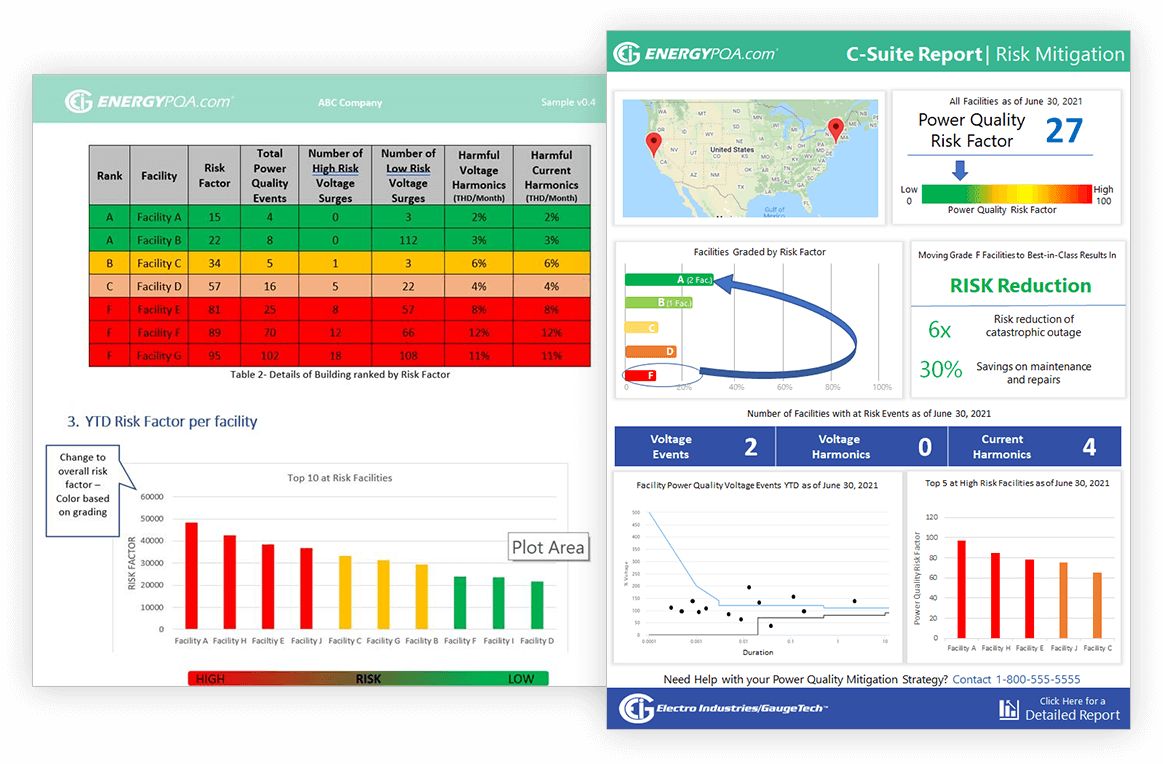
Risk Mitigation C-Suite Reports Identify Sources of Unreliable Energy
Risk Mitigation C-Suite Reports
- Automatically grade facility reliability and determine the overall risk factor for power quality.
- Obtain detailed enterprise level power quality reports on all facilities.
- Single facility reports provide highest risk circuits in need of infrastructure remediation.
- Identifying specific circuits in worst facilities provides simple meaningful actions to improve reliability and safety of the power system.
Automated Report Generator
Generate Customized Spreadsheet-based Reports on Data, Enterprise Wide
- Highly configurable report generator.
- Comes with many standard report templates.
- Create custom reports or edit templates.
- Built-in summation and averaging of data.
- Create complex formulas for specific calculations.
- Charting and graphing.
- Automated configurable email scheduler.
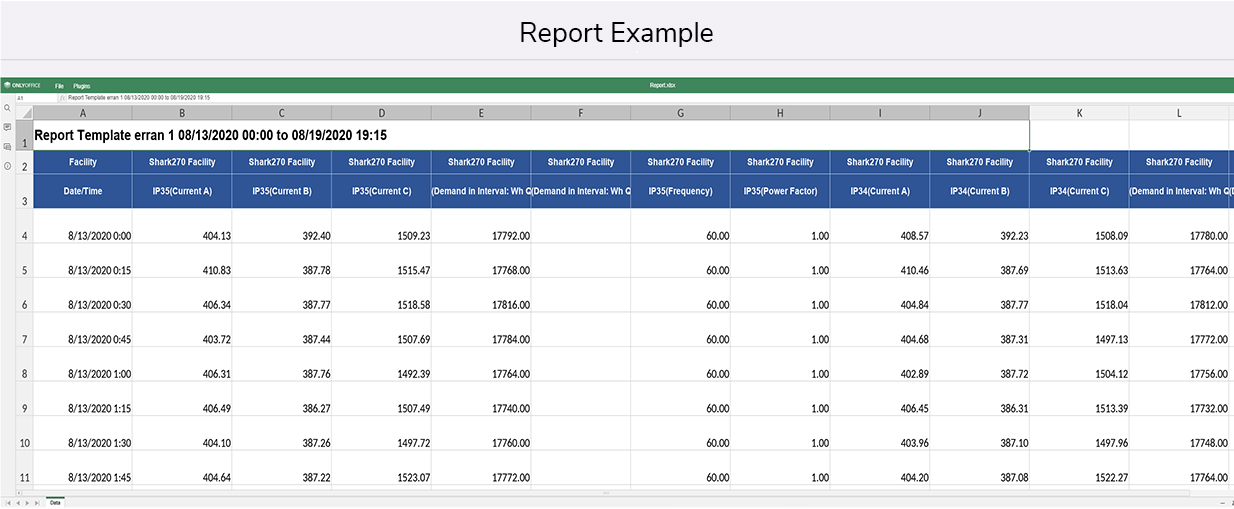
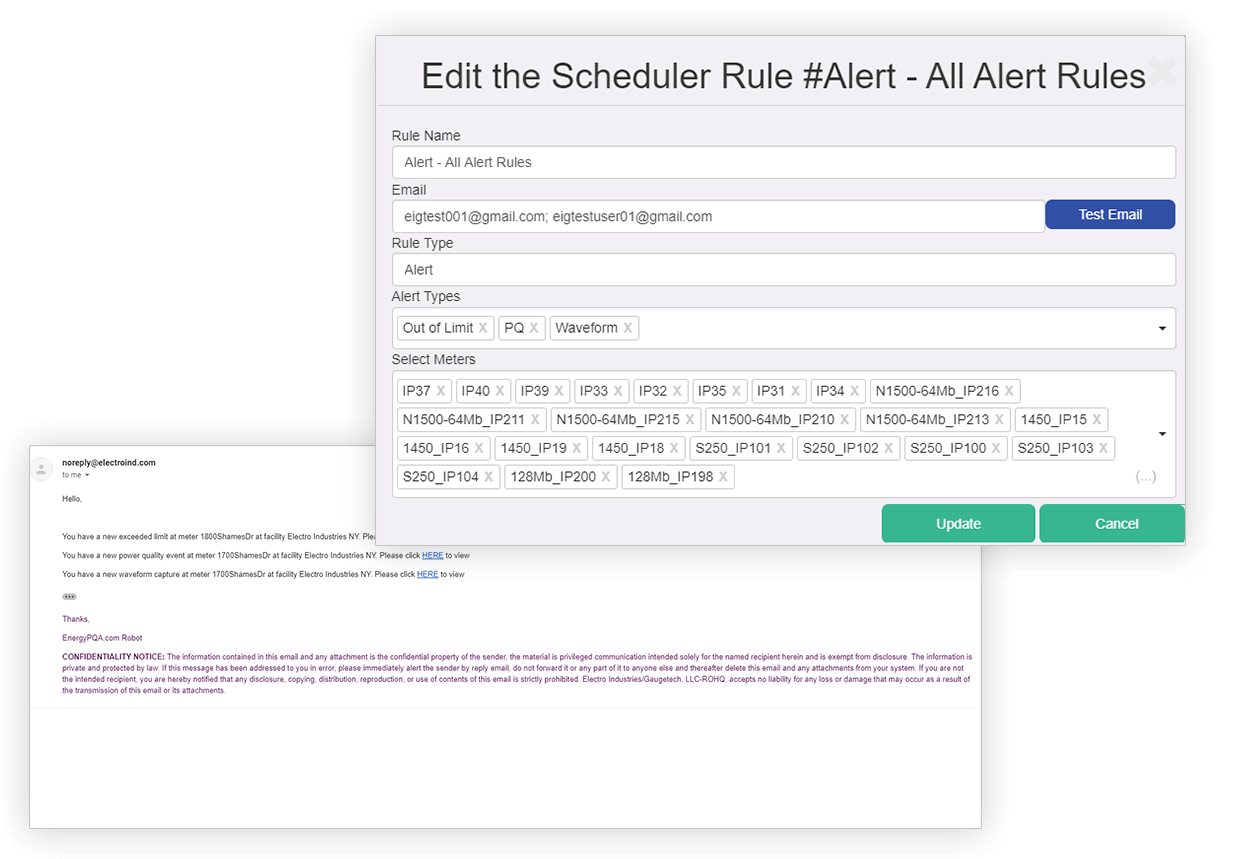
Hourly Email Alerts
Program Email Alerts for Multiple Meter Conditions
- Set up email alerts in the energy management system for:
- Peak demand.
- New predicted peak demand within three days.
- All power quality events.
- Out of limit conditions, including W.A.G.E.S. leak detection.
- New waveform recording.
- Send to multiple email addresses.
- Alarm on events supports timely action and issue resolution.
Billing
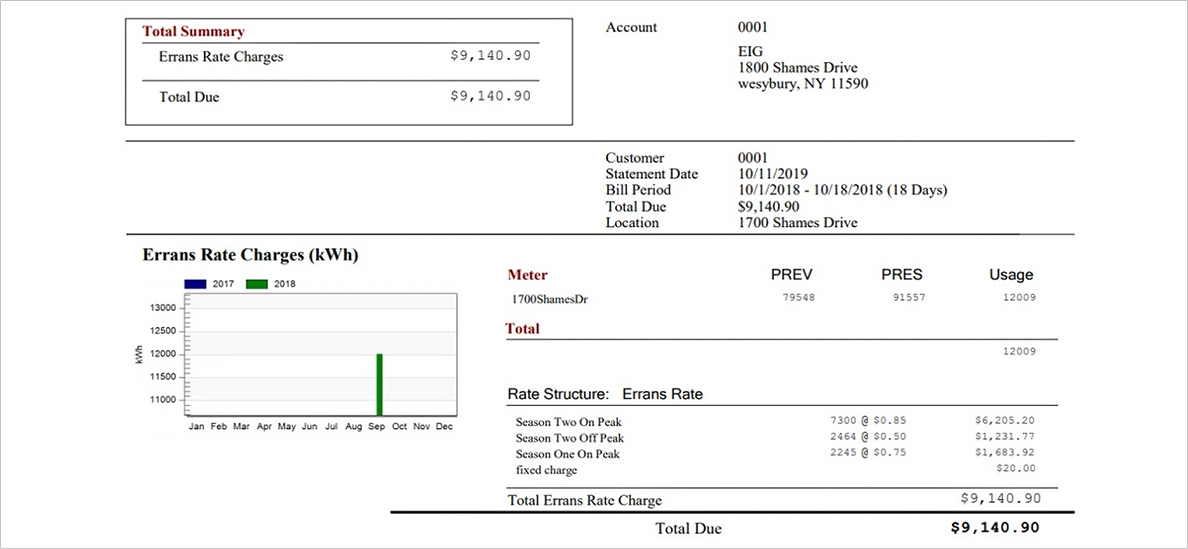
Bill Generation
Automatically Send Electric Utility Bills for Submetering
- Providing energy awareness by sending utility bills can save up to 15% of energy costs.
- Customized bill formats.
- Automated bill distribution.
- Time of Use billing.
- Customized reporting and rate structures.
- Additional commodities (water, gas).
- Supports most advanced billing rate structures.
Architecture
System Architecture
Eliminate the Need for Internal IT and Engineering Resources
- Intelligent plug and play system auto-discovers installed meters.
- Automatic collection of data.
- Intuitive user interface and reports.
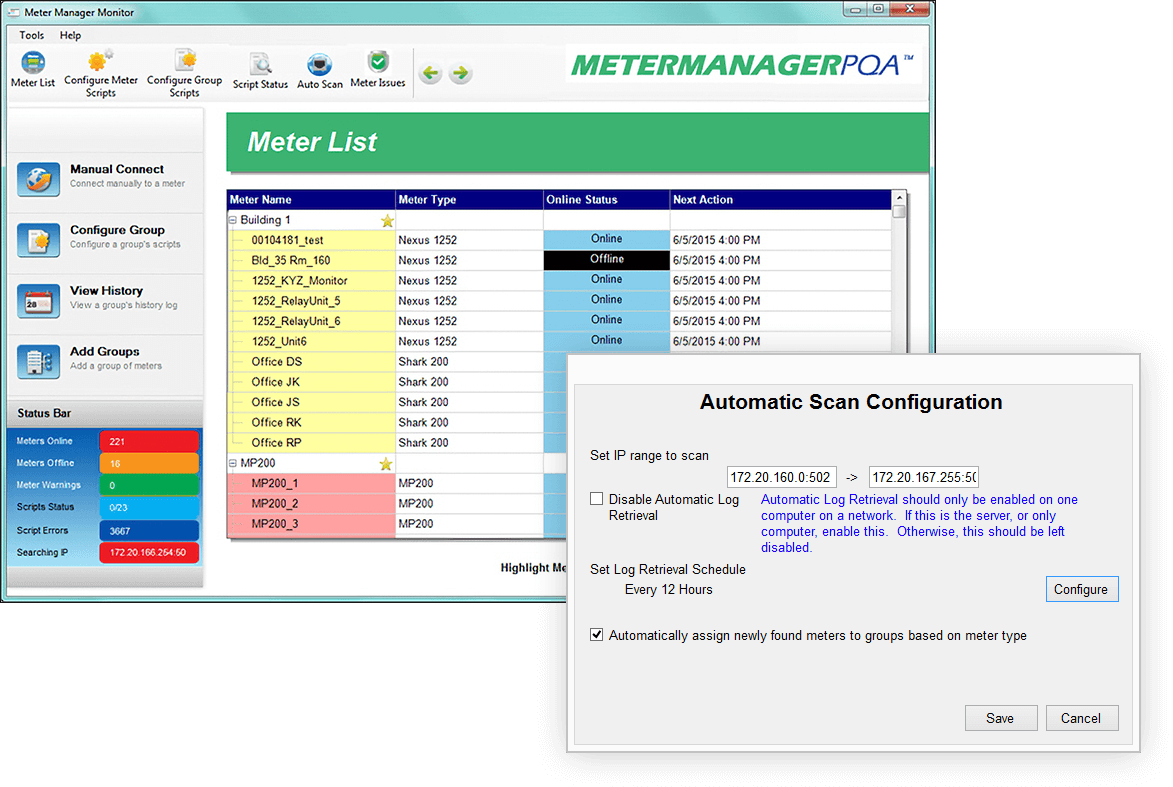
Discovers and Groups Network Meters for Easy Management
Meter Data Management
Reduce System Commissioning and Eliminate Integration Problems
- Discover and group meters on a network.
- Collect historical, alarm, security, and power quality data.
- Push data to EnergyPQA.com® from facility.
- Scan meter health and quality of service.
- Determine meter wiring errors.
- Time synchronization server.
- Get the system working in minutes and not months.
Data Integrity and Cyber Security
Proven Security and Encryption Technologies Provide Acceptance by Corporate IT Policies
- Cloud computing architecture.
- Data stored redundantly at customer site and in the cloud.
- Network security: SSL encryption.
- Role-based authorization.
- Dual factor authentication, including optional TOTP authentication.
- Encrypted passwords and API keys.
- Data security: firewalls, intrusion detection, and encryption.
- EnergyPQA.com® monitors your metering devices and system software to ensure they are up-to-date with the latest cyber secure protocols.
DataLink™ API
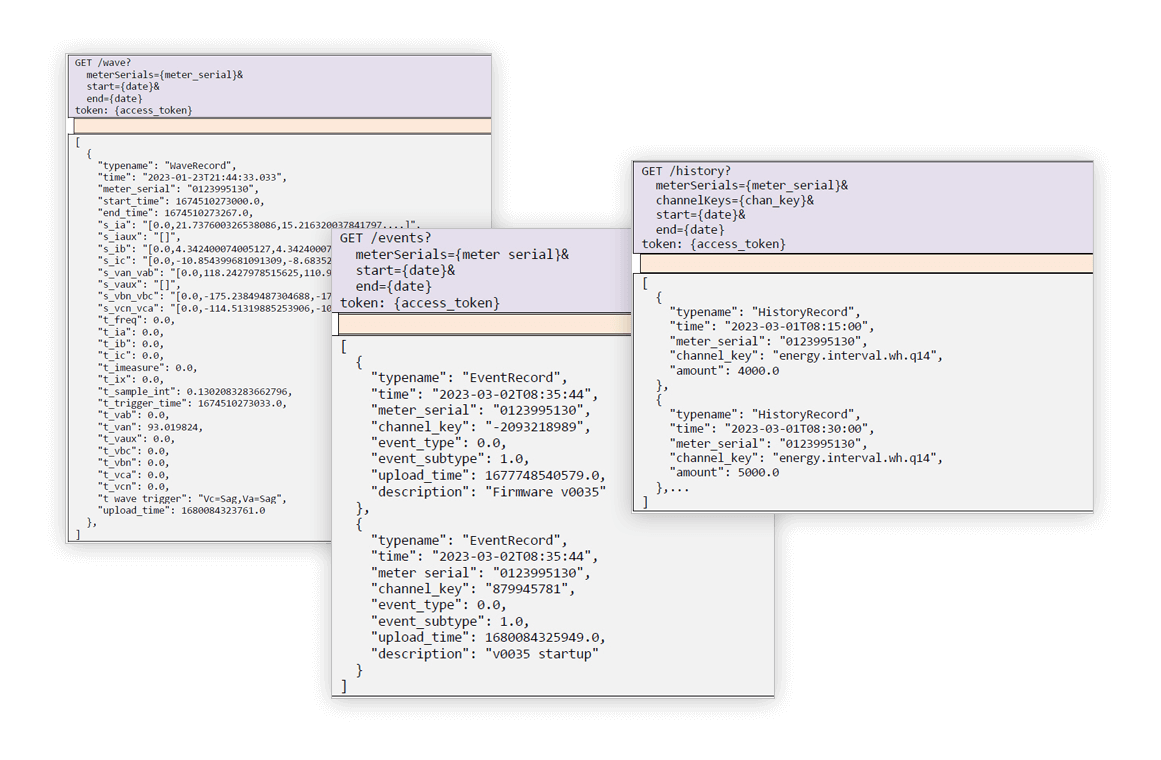
DataLink™API
New! Application Programming Interface (API) Support
- DataLinkTM API allows the EnergyPQA® system to communicate with another program.
- Export data from EnergyPQA® in standard JSON format.
- Import the data into a third party application or use it any other way.
- Data can be collected from the historical, system events, limits, power quality, and waveform logs, or from carbon footprint (CO2) data.
- Instructions and samples are provided.
- DataLinkTM API is secured by role-based authorization.
Downloads
Downloads
Tech Documents
Generic Specifications
FAQ
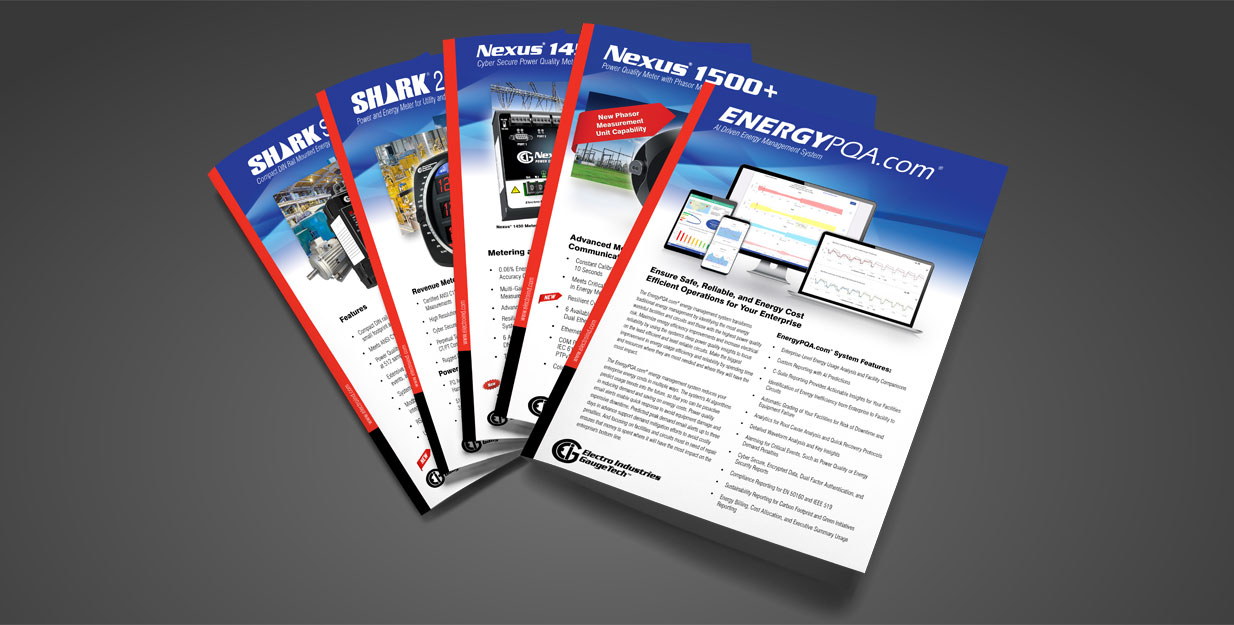
FAQ’s
What is energy management software?
Energy management software enables businesses to track and analyze energy usage to become more energy efficient, lower their energy costs, and improve their carbon footprint. When energy management software uses machine learning and artificial intelligence, it can predict future energy usage and demand. This information enables action to reduce demand penalties, shift loads, and better manage energy resources. Energy management software can analyze energy usage across multiple facilities, identify poorly performing buildings, and determine areas for cost-saving and sustainability improvements. The software can also provide enterprise-level reporting and power quality analysis. It allows alarms to be set on power quality and in the case of AI driven energy management systems, predicted demand. Overall, energy management software provides businesses with the tools they need to reduce energy usage, reduce costs, and improve their environmental impact.
Who uses energy management software?
Energy management software is used by commercial, industrial, healthcare, educational, and government facilities looking to optimize their energy usage, improve power quality, and reduce costs. Software with features such as AI predictive analytics and enterprise-level usage and carbon footprint reporting is ideal for sustainability and go-green initiatives. By monitoring and comparing energy usage across facilities, organizations can identify poorly performing buildings and act on peak demand predictions in advance of a demand penalty. Energy management software is a valuable tool for any organization looking to improve energy efficiency and power quality as well as reducing their costs and carbon footprint.
Why is energy management software important?
To lower energy usage, reduce costs, and lower carbon footprint, it is necessary to understand energy usage and the quality of the energy being delivered to an organization by the utility. Energy management software provides the information necessary to manage an organization’s energy usage. Advanced energy management systems, such as the EnergyPQA® AI driven energy management system, utilize AI-driven analytics to predict energy usage, identify poorly performing buildings, and provide enterprise-level reporting to help organizations manage energy consumption. With this software, facilities can reduce their carbon footprint, decrease energy usage and expenses, ensure high power quality, and promote a more sustainable future. Energy management software is an essential tool for organizations seeking to save money and improve their environmental impact.
What types of commodities can be managed by energy management software?
Advanced energy management software can manage and analyze a wide range of utilities in addition to electrical energy. They should be able to measure water, air flow, gas, electric, and steam (W.A.G.E.S.) usage and provide usage dashboards with comparisons over time. This helps businesses identify problems with their W.A.G.E.S. commodity usage. The EnergyPQA® AI driven energy management system can identify problems such as water or air flow leaks. Its predictive engine helps facility managers plan for future usage rather than being surprised by it when it occurs.
What are the deployment options for energy management software?
Energy management software can be deployed on-premise or in the cloud. An on-premise Energy Management System requires the installation of software on local PCs and servers and is generally managed by the organization’s IT department personnel. Cloud-based Energy Management Systems, on the other hand, are accessed through a web browser and managed by a third-party provider, which can offer lower upfront costs and automatic software updates. The EnergyPQA® AI driven energy management system is software as a service and provides a secure system that can be expanded easily as needs change.




